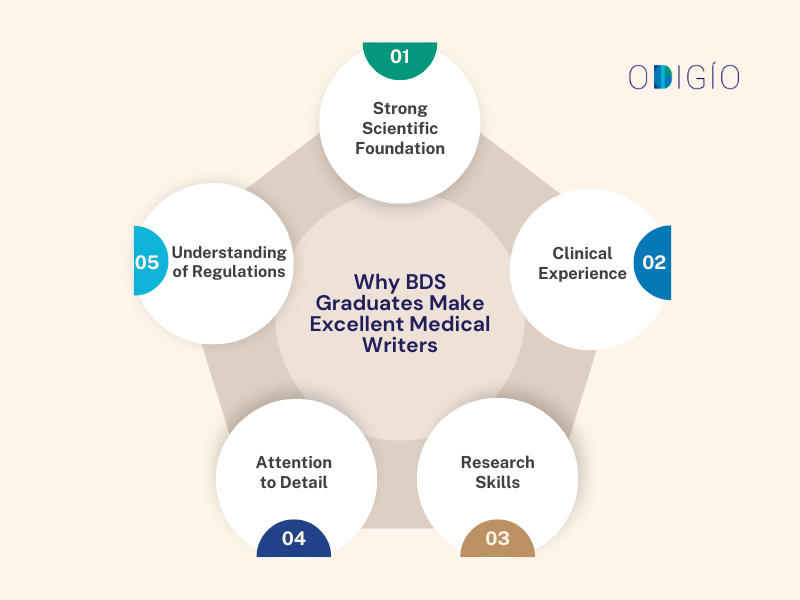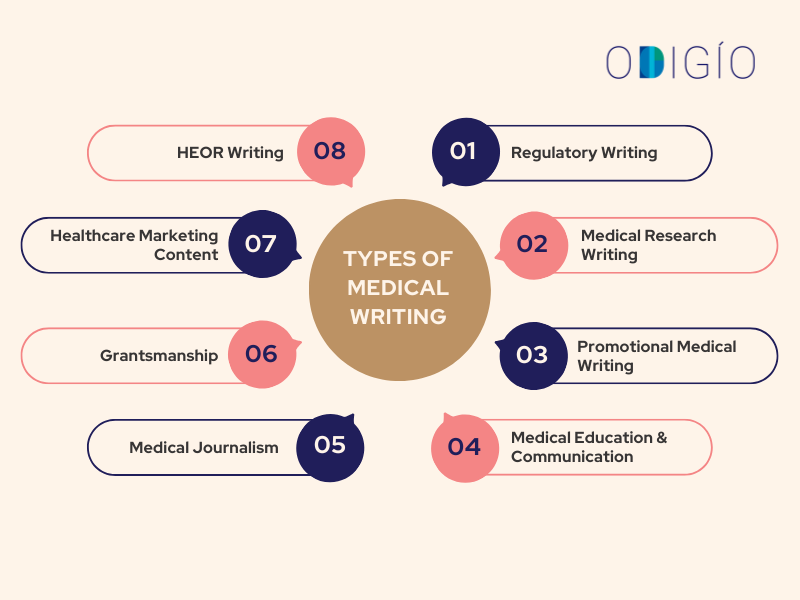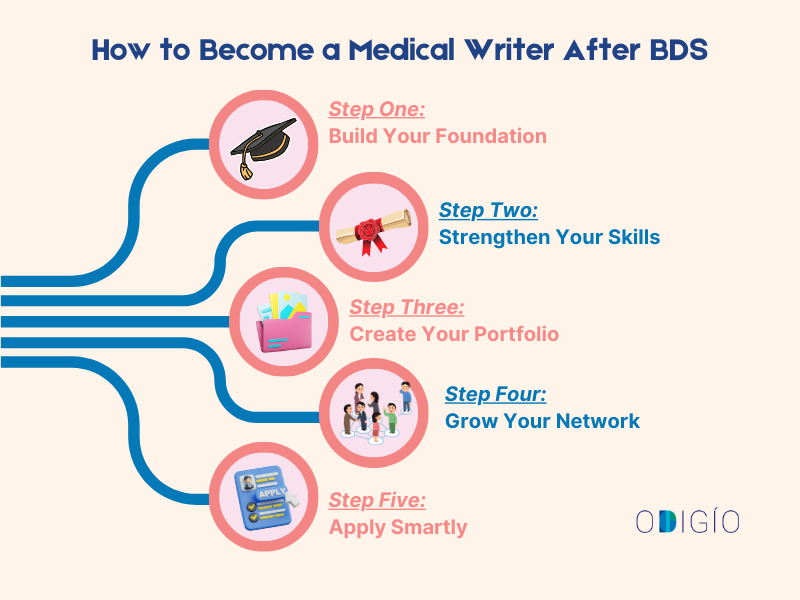Medical Writing after BDS: A Career Guide
Writer: Dr. Peddi Sunayana, Reviewer: Dr. Astha Mishra
If you can explain treatment to patients, you can explain medicine to the world. That’s exactly what medical writing after BDS helps you do.
The podcast below features Dr Tanya Prasad, a freelance medical writer. Watch it for deeper insight into the role and know how to get started.
Understanding Medical Writing For Healthcare Professionals
What is Medical Writing?
Medical writing after BDS involves creating scientific material that deals with medical and healthcare fields in a language that is easily understood by the target audience.
Why BDS Graduates Make Excellent Medical Technical Writers?
Dental education equips you with a set of skills and knowledge which is versatile and has competitive advantages, like:
- Strong Scientific Foundation: Your in-depth knowledge of various medical subjects enables you to accurately understand and interpret clinical and related data.
- Clinical Experience: Real-world patient management experience helps you understand patient needs even without direct interaction with patients. The skill also helps communicate complex concepts effectively.
- Research Background: Studying medicine helps you develop research skills in methodology and evidence-based dentistry, which are directly applicable to medical writing.
- Attention to Detail: Qualities such as precision and accuracy developed throughout the dental curriculum translate into essential transferable skills for medical writing.
- Regulatory Knowledge: Your familiarity with healthcare regulations and healthcare considerations translates well into regulatory medical writing.
Source: pmc.ncbi(1)

What is the Scope of Medical Writing?
Clinical writing was the largest revenue-generating profession in 2023. The Indian medical writing services market is projected to grow at a CAGR of 12.3% from 2024 to 2030. (2)
The scope of medical writing is multidirectional. Here are some key categories and areas a medical writer typically works on:
- Scientific and Clinical Documents
- Clinical reports
- Research papers
- Clinical trial protocols
- Medical manuscript writing
- Educational Documents
- Manuals
- Brochures
- Health education materials
- Patient information leaflets
- Regulatory Documents
- Grant proposals
- Regulatory submissions
- Healthcare policy documents
- Marketing and Promotional Content
- Marketing materials for products, equipment, and services
- Healthcare content writing
A medical science writer helps bridge the gap between science and communication across healthcare, research, and patient education.
The demand for medical content writers has increased over the past few decades, driven by growing research in this field, which indicates a significant scope.
Medical Writing after BDS in India?
We are here to help
Types of Medical Writing in the Medical Field
As a health writer, you create various types of documents tailored to different audiences, including healthcare professionals, patients, and regulatory bodies.
- Regulatory Medical Writing: Creating documents for drug and device approvals, including:
- Clinical study reports
- Investigator brochures and
- Regulatory submission documents for the pharma companies.
- Medical Research Writing: Also known as Scientific Publications, involves:
- Drafting peer-reviewed journals
- Abstracts
- Posters and conference presentations based on clinical trials and research studies.
- Medical Promotional Writing: Involves writing:
- E-learning modules
- Promotional brochures for healthcare products targeting healthcare professionals.
- Medical Education and Communication: Developing materials like:
- Patient education material, like leaflets
- Medical education content, like blogs, e-modules, and CME programs, for the medical fraternity.
- Medical Journalism: Writing articles for:
- Medical magazines and newspapers
- This needs to be written in a non-technical language because the target audience is the general public.
- Grantsmanship: Grant proposals
- Healthcare Marketing Content: Includes:
- Creating promotional materials
- Product monographs
- Sales training materials while ensuring compliance with regulations.
- Health Economics and Outcomes Research (HEOR) Writing: Writing which communicates treatment value through HTAs and market access dossiers to support reimbursement and patient access.
Source: pmc.ncbi(3)

Now that we have covered the basics, let’s explore additional skills required to become a medical writer.
Skills You Need to Develop
While your BDS provides a solid foundation, consider strengthening these additional skills:
- Practice concise, grammatically correct, and factually accurate writing; this will also help build a strong portfolio.
- Read niche-specific articles to gain a deeper understanding of the structure.
- Get familiarise with organisational guidelines & regulatory submissions.
- Read about the FDA or EMA to obtain approval for drugs, biologics, and medical devices.
- GPP to understand roles, data ownership, and sponsor relations.(4)
- Understand basic biostatistics to effectively interpret clinical trial data.
- Core Writing & Productivity Tools
- Microsoft Office (Word, Excel, PowerPoint): The essentials for drafting, editing, data handling, and creating presentations.
- Google Workspace (Docs, Sheets, Slides): Enables real-time collaboration and seamless file sharing.
- Grammar & Style Checkers: Ensure clarity, correctness, and adherence to style guidelines.
- Research & Data Management Tools
- Literature Databases (PubMed, ClinicalTrials.gov, EMBASE): Used to conduct credible, comprehensive research for any topic. (5)
- Reference Managers (EndNote, Mendeley, Zotero): Organise citations and auto-generate correctly formatted references.
- Statistical Software (SAS, SPSS, GraphPad): Help interpret research data and present tables or graphs accurately.
- Unpaywall: A simple tool to access free, legal full-text research articles.
- Specialised & Creative Tools
- Generative AI Tools (ChatGPT, Gemini): Support brainstorming, summarising, and boosting writing efficiency.
- Visual Tools (BioRender, Canva, Photoshop): Create scientific figures, diagrams, and infographics.
- Freelancing & Workflow Tools
- Content Management Systems (Datavision, FrameMaker): Used in pharma settings to manage documents and maintain compliance.
Source: amwa(6)
Let’s understand the roles and responsibilities of a medical writer in detail below.
Roles and Responsibilities of a Medical Writer
A medical writer’s role includes interpreting research, analysing statistics, compiling all available evidence-based data, and presenting a medical report or document that adheres to regulations.
A professional medical writer is capable of communicating effectively with relevant personnel, including healthcare experts, researchers, and scientists, and providing accurate information.
Let’s explore how you can become a medical writer after completing your BDS.
Switch to Medical Writing
Explore the path
Your Step-by-Step Guide to Medical Writing
Transferable Skills from Clinical Dentistry
The following are the transferable skills that can be of use:
- To be able to do research, interpret the data and results, and give information in an understandable format.
- A science background is always a boon because of a strong understanding of medical terminology and clinical concepts.
- To be able to communicate and collaborate with experts to understand the facts and to give accurate information. (Hint: highlight your experience of collaborating with specialists in clinics)
How to Become a Medical Writer After BDS?
Follow these steps to transition your career into a medical writer after BDS:
- Complete your Education – Pursue any bachelor’s degree in the science field and enrol in free medical writing courses.
- Pursue Certification Courses – Free certification courses can be done to improve your skills (if required)
- Prepare Portfolio – Start writing on dental and medical topics or write review articles.
- Network – Network with other writers, publishers, experts, and, most importantly, people hiring for the open roles through LinkedIn.
- Apply for the Job – Include relevant keywords from the job description when drafting your resume.
* At Odigio, we only recommend free courses.

We are here to help you get a job. Hit the button below to get in touch with us!
If you’ve made it this far, discover how a strong portfolio can be the key to helping you move forward as a health writer after completing your BDS.
Creating a Strong Portfolio
Medical Writing Jobs in India
To get a job in this domain, there are many ways; for example, you can start a medical writing internship.
Additionally, numerous part-time freelance opportunities in medical writing are available.
However, before we proceed, let’s first understand how to identify medical writing jobs and how to tailor your application.
- Resources for finding job openings include job boards, company websites, and professional networking platforms such as LinkedIn and Indeed.
- Freshers can explore internships or freelance opportunities on Internshala.
- Jobs for health writers can be provided by various industries, such as:
- Clinical research organisations
- HealthTech companies
- Healthcare agencies
- Pharmaceutical companies
- Medical device manufacturers.
- Medical and media publishing firms
- Entry-Level Roles
- Associate Medical Writer: Supports seniors with research, drafting, and documentation.
- Junior Medical Writer: Writes basic content, edits drafts, and learns industry standards.
- Mid-Level Roles
- Medical Writer: Independently handles projects, interfaces with reviewers, and manages timelines.
- Scientific/Content Specialist: Works on complex documents, publications, or specialised domains (regulatory, clinical, promotional).
- Senior Roles
- Senior Medical Writer: Leads projects, reviews junior writers’ work, and ensures scientific accuracy and compliance.
- Senior Scientific Writer: Handles high-level manuscripts, regulatory documents, and complex data-driven content.
- Leadership & Specialist Roles
- Lead Medical Writer / Team Lead: Manages a team, mentors writers, allocates projects, and ensures quality across deliverables.
- Principal Medical Writer: Oversees major accounts, handles high-stakes documents, and sets writing standards.
- Medical Writing Manager: Manages teams, client communication, project delivery, and strategic planning.
- Director / Head of Medical Writing: Leads the department, builds strategy, manages clients, and oversees operations.
To help you with this, Odigio Careers is here to assist you with resume editing, cover letter preparation, LinkedIn optimisation, interview preparation, networking, and job search strategies.
So, wait no more and seize this opportunity to land your dream job!
Conclusion
Medical writing after BDS opens many doors for you beyond traditional clinical practice.
It’s a highly versatile profession that enables you to apply scientific knowledge in various ways while remaining connected to the healthcare field.
For those who want flexibility, whether part-time or full-time, it offers a path where your knowledge continues to create value, just in a new format.
Through continuous learning, dentists can carve out a fulfilling, niche-specific, non-clinical career.
Contact us today & make the transition of your dreams!
Need Guidance to Begin?
Book a call
FAQ
References
- PMC: How to Become a Competent Medical Writer?
- Grand View Research: India Medical Writing Market Size & Outlook, 2023-2030
- PMC: Good publication practice guideline 3: Evolving standards for medical writers
- AMWA: The Home Office Toolkit: Software for Freelance Medical Communicators
- Glassdoor: Medical Writer Salaries
